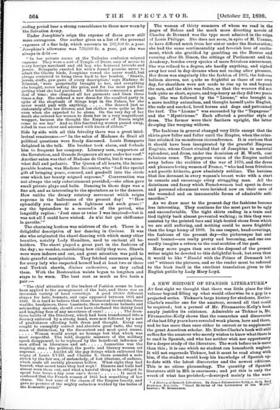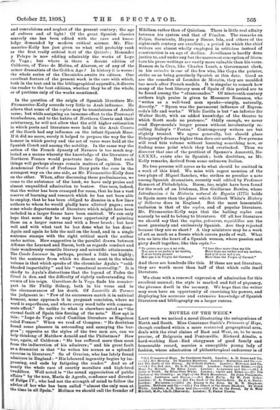we are still suffering, and nothing could be more frightful
than the huge hump of 1888. In one respect, head-coverings, the fashions of the present day—the picturesque hat and small bonnet—are really pretty and becoming, and one can hardly imagine a return to the coal-scuttles of the past.
Many more pages than are at the disposal of the present writer might be devoted to this delightful book, but even then it would be like "Hamlet with the Prince of Denmark left out" without the pictures, and so the reader must be referred to the book itself in the excellent translation given to the English public by Lady Mary Loyd.
A NEW HISTORY OF SPANISH LITERATURE.* AT first sight we thought that there was little place for this volatile beyond filling up what would otherwise be a gap in a projected series. Ticknor's large history for students, Butler- Clarke's smaller one for the amateur, seemed all that could be required ; but a perusal of Mr. Fit zmaurice-Kelly's book amply justifies its existence. Admirable as Ticknor is, Mr. Fitzmaurice-Kelly shows that the researches and discoveries of the last fifty years have revealed weak places, here and there, and he has more than once either to correct or to supplement the great American scholar. Mr. Butler-Clarke's book will still suffice for the amateur who merely wishes to know what there is to read in Spanish, and who has neither wish nor opportunity for a deeper study of the literature. The work before us is more than this ; it is one which no student can henceforth neglect. It will not supersede Ticknor, but it must be read along with him, if the student would keep his knowledge of Spanish up- to-date with the latest discoveries and the newest editions. This is no otiose phraseology. The quantity of Spanish literature still in MS. is enormous ; and yet this is only the wreck of what has perished,—destroyed mainly in the wars • A Ilistoty of Spanish Literature. By Janie Fitzmaurice-Kelly, c. de is Reel Academia " Shoit lihtories of the Literatures or the Wcrid.' Landau 1 W. Ideinernann, and convulsions and neglect of the present century; the age of culture and of light ! Of the great Spanish classics scarcely one has been edited with the care and know- ledge demanded by modern critical science. Mr. Fitz- maurice-Kelly has just given us what will probably rank as the first really critical text of the Quixote ; Menendez y Pelayo is now editing admirably the works of Lope de Vega ; but where is there a decent edition of Calderon, of Tirso de Molina, of Alarcon, or of any of the minor dramatists of the Golden Age ? In history it is worse; the whole series of the Chronicles awaits its editors. One excellent feature of the present work is the care with which, both in the text and in the bibliographical appendix, it directs the reader to the beat editions, whether they be of the whole, or of portions only of the works mentioned.
In the question of the origin of Spanish literature Mr. Fitzmaurice-Kelly accords very little to Arab influence. He allows that some of the coplas may be translations of Arabic verse; but while assigning an immense effect to the Provençal troubadours, and to the habits of Northern Courts and their aristocracy, he will not allow that the still higher estimation in which poets and literature were held in the Arab Courts of the South had any influence on the infant Spanish Muse. If it did no more, surely it helped to prepare the way for the honour in which poetry and the art of verse were held at the Spanish Court and among the nobility. In the same way the action of the French dynasty of Navarre is too much neg- lected as a means whereby the knowledge of the literature of Northern France would penetrate into Spain. But such things will perhaps always remain matters of opinion. The Academical Oratio of Professor Dozy puts the case in the strongest way on the one side, as Mr. Fitzmaurice-Kelly does on the other. When, after discussing these preliminaries, we come to the substance of the book, we have only praise and almost unqualified admiration to bestow. One sees, indeed, that the writer has been cramped for room, that he has a vast reserve of learning and research which he has not been able to employ, that he has been obliged to dismiss in a few lines authors to whom he would gladly have allotted pages ; even some whole departments of literature which might have been included in a larger frame have been omitted. We can only hope that some day he may have opportunity of painting these on a larger canvas and with a freer brush ; but how well and with what tact he has done what he has done ! Again and again he hits the nail on the head, and in a single sentence stamps with the right critical mark the author under notice. How suggestive is the parallel drawn between Alfonso the Learned and Bacon, both as regards conduct and their wondrously versatile literary and scientific attainments. The Conde Lucanor is, perhaps, praised a little too highly ; but the sentence from which we dissent most in the whole volume is that which speaks of the chronicler Ayala's "cold- blooded impartiality" and his "unnatural neutrality." It is chiefly to Ayala's distortions that the legend of Pedro the Cruel is doe, and the difficulty of rightly understanding the events of his reign. Garcilaso de la Vega finds his counter- part in Sir Philip Sidney, both in his verse and in the circumstances of his death. Of Lazarillo de Tormes the judgment is : "Few of its successors match it in satirical humour, none approach it in pregnant concision, where no word is superfluous, and where every word tells with consum- mate effect." So unlike to what is elsewhere noted as "the eternal fault of Spain this forcing of the note." How apt is this : "Lope de Vega ruled Castilian literature as Napoleon ruled France." When we read of Gongora: "He doubtless found some pleasure in astounding and annoying the bur- gess"; opposite as the styles of the two men are, can we help thinking of Matthew Arnold and the Philistines ? How true, again, of Calderon : "Re has suffered more than most from the indiscretion of his admirers ; " and his great fault as a dramatist is that "ho writes his scenes as a splendid exercise in literature." So of Grecian, who has lately found admirers in England : "His laboured ingenuity begins by im- pressing, and ends by fatiguing the reader." And so of nearly the whole race of courtly moralists and high-bred twaddler& Well noted is "the sound appreciation of public affairs" by the nun, Maria de Agreda, confessor and director of Felipe IV., who had not the strength of mind to follow the advice of her who has been called "almost the only man at the time in all Spain." Molinos we should call the founder of Nihilism rather than of Quietism. There is little real affinity between his system and that of Fenelon. The remarks on Feijoo, Sarmiento, Mayans y Siscar, Isla, and others of the eighteenth century are excellent; a period in which the chief writers are almost wholly employed in criticism instead of construction is an age of decline. Jovellanos is hardly done justice to, and under any but the narrowest conception of litera- ture his prose writings are vastly more valuable than his verse. Ramon de la Crez, like Charles Lamb, a Government clerk, in his sainetes is one of the few who, like Goya the painter, strike us as being genuinely Spanish at this date. Good as are the comedies of Leandro de Moratin, they are moulded too much after French models. It is singular to remark how many of the beat literary men of Spain of this period are to be found among the " afrancesados." Of nineteenth-century authors high praise is given to Mesonero Romanos, who "writes as a well-bred man speaks—simply, naturally, directly." "Byron was the paramount influence of Espron- ceda's life and works." While Zorilla is but "an inferior Sir Walter Scott, with an added knowledge of the theatre to which Scott made no pretence." Oddly enough, we never read Espronceda's longer poems without involuntarily re- calling Bailey's " Festus." Contemporary writers are but slightly treated. We agree generally, but should place Echegaray's dramas higher than does our author. Few persons will read this volume without learning something new, or finding some point which they had overlooked. Thus we discover that one of the prettiest of Spenser's Amoretti, No. LXXXI., exists also in Spanish ; both doubtless, as Mr. Kelly remarks, derived from some unknown Italian.
No two persons will agree as to what should be omitted in a work of this kind. We miss with regret mention of the two plays of Miguel Sanchez, who strikes so peculiar a note among Spanish dramatists, recently well edited by Professor Rennert of Philadelphia. Room, too, might have been found for the work of an Irishman, Don Guillermo Bowles, whose Introduccion a la Historic', natural de Espana (1775) holds in Spain more than the place which Gilbert White's History of Selborne does in England. But the most lamentable exclusion is that of the copies, and of popular literature. Mr. Fitzmaurice-Kelly says that the halting coplas can scarcely be said to belong to literature. Of all her literature we should say that the coplas, peteneras, seguidillas are the most genuinely and exclusively Spanish. Are they rejected because they are so short ? A tiny miniature may be a work of art as much as a fresco which covers yards of wall. What lets us into the heart of a Spanish woman, where passion and piety dwell together, like this copla ?— "Te quiero ma• qua 6, mi vide. "I love thee more than my life
Mae quo A wi padre y mi madre, More than my father and my mother, Y ei uo fuera pecado And if it teems not a sin Mas qui) A in Tirgen del Carmen. More than the Virgin of Carmel."
And there are hundreds like this. If these are not literature, they are worth more than half of that which calls itself literature.
We close with a renewed expression of admiration for this excellent manual; the style is marked and full of piquancy, the phrases dwell in the memory. We hope that the writer may soon have an opportunity of exercising his powers, and displaying his accurate and extensive knowledge of Spanish literature and bibliography on a larger canvas.
NOVELS OF THE WEEK.*
LIST week we noticed a novel illustrating the antagonisms of North and South. Miss Constance Smith's Prisoners of Hope, though confined within a more restricted geographical area, deals with the rival claims of East and West, or, to be more precise, of Belgravia and Pentonville. Richard Ainslie, a hard-working East End clergyman of good family and honourable record, marries a susceptible young lady of fashion, whose admiration of philanthropical endeavour is of











































 Previous page
Previous page